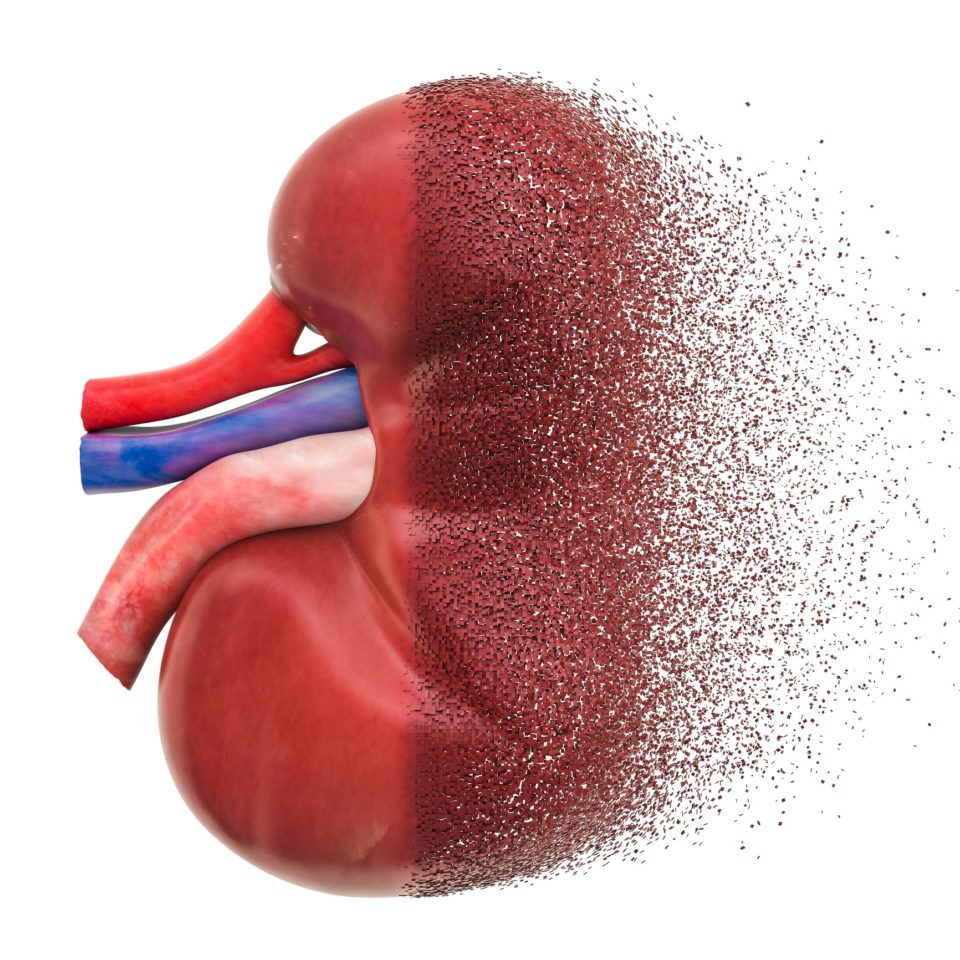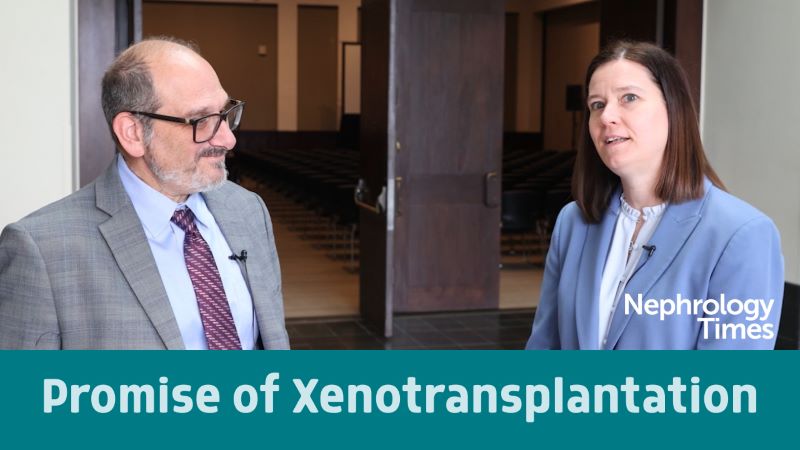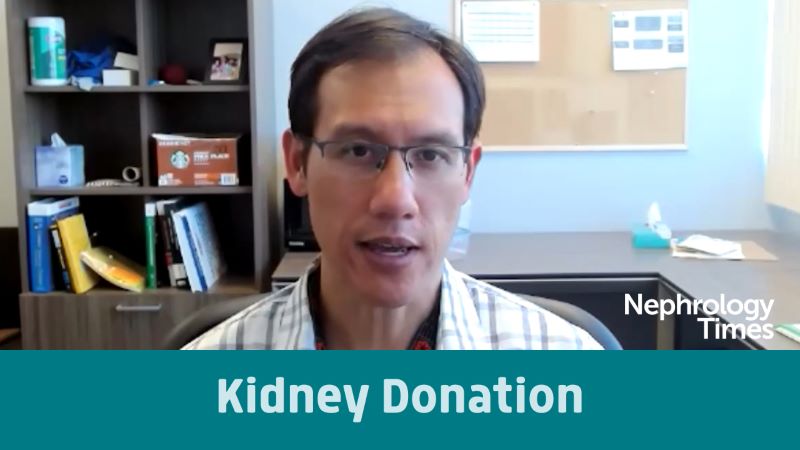
Recipients of kidney transplantation are required to maintain immunosuppressive drug treatment to prevent allograft rejection. There are three drugs in the most common immunosuppressive drug regimen: a calcineurin inhibitor (cyclosporine or tacrolimus), mycophenolic acid or azathioprine, and corticosteroids (e.g., prednisone).
Due to adverse effects of corticosteroids, inclusion in immunosuppressive protocols is undesirable; however, cessation is associated with a higher risk of short-term rejection. Long-term outcomes of patients withdrawn from corticosteroids are unclear. E. Steve Woodle, MD, and colleagues conducted a study designed to compare long-term kidney transplant outcomes of patients randomized to continue or withdraw corticosteroids. Results of the prospective, multicenter, randomized, double-blind, placebo-controlled trial were reported online in JAMA Surgery [doi.1001/jamasurg.2020.6929].
Patients were randomized to receive tacrolimus and mycophenolate mofetil with or without corticosteroids 7 days following transplant. The outcomes of interest were kidney allograft failure from any cause, including death, and allograft failure censored for patient death, defined by the requirement for long-term dialysis or repeat transplant.
Of 385 patients, 191 were randomized to withdraw from corticosteroids (mean age, 46.5 years) and 194 were randomized to continue corticosteroids (mean age, 46.3 years). Of the 191 in the corticosteroid withdraw group, all 191 patients were identified for long-term follow-up in the Organ Procurement and Transplant Network (OPTN) registry; in the continued corticosteroid group, all 194 were identified for long-term follow-up in the OPTN registry.
During the 5-year trial follow-up period, 25 patients in the withdraw group and 31 in the continuation group were lost to follow-up or withdrew consent. A total of 24 patients died (11 in the withdrawal group and 13 in the continuation group) and there were 18 cases of allograft loss censored for death (11 in the withdrawal group and 7 in the continuation group) reported in the trial.
The median follow-up time was 15.8 years after transplant. Outcomes in the trial participants beyond 5 years after transplant were ascertained in the OPTN registry until June 2018.
In the intention-to-treat analysis, there were no differences between the corticosteroid withdrawal group and the corticosteroid continuation group in time to allograft failure from any cause including death and time to allograft failure censored for death. The unadjusted hazard ratio (HR) of allograft loss from any cause in patients in the withdrawal group was 0.84 (95% confidence interval [CI], 0.64-1.12; P=.23) compared with patients in the continuation group. The HR for allograft loss censored by death was 0.77 (95% CI, 0.52-1.16; P=.21). Results of multivariable analysis were similar.
Actual allograft half-lives were defined as time from transplant until allograft failure from any cause including death. In the corticosteroid continuation group, actual allograft half-lives were 14.7 years compared with 17.5 years in the group that discontinued corticosteroids. Results of the per protocol analysis were similar.
There were no significant differences between the two groups in time to death at any time after transplant and time to death censored at time of allograft failure.
In subgroup analysis of time to allograft failure from any cause including death, better outcomes were seen in living donor recipients, non-Black recipients, patients without rejection, and patients without diabetes. There were no significant differences between the group that continued corticosteroids and the group that discontinued corticosteroids in those subgroups. In subgroup analyses of time to allograft failure censored for death, results were similar.
The trial findings were validated comparing characteristics of the transplant recipients in the OPTN registry in the original trial with contemporary registry patients grouped by whether they were or were not treated with maintenance corticosteroids. With the exception of receiving more nondepleting induction, the contemporary registry patients were similar to trial participants. During the median follow-up of 15.8 years, the outcomes of trial participants treated with or without corticosteroids were similar to those of registry patients.
In multivariable analyses that combined trial patients and OPTN registry patients, the HR for graft loss from any cause including death was 0.86 (95% CI, 0.70-1.08) in patients in the corticosteroid withdrawal group compared with patients treated with corticosteroids. The HR for allograft loss censored by death was 1.06 (95% CI, 0.79-1.40).
Outcomes among trial participants were similar to those of OPTN registry patients (allograft failure from any cause: HR, 0.90; 95% CI, 0.73-1.10; P=.31; allograft failure censored by death: HR, 1.01; 95% CI, 0.75-1.34; P=.97). The interaction terms for corticosteroid use by trial participants were nonsignificant (allograft failure from any cause: HR, 0.99; 95% CI, 0.70-1.41; P>.99; allograft failure censored by death: HR, 0.76; 95% CI, 0.46-1.25; P=.28). Those results suggest there was no significant variation between trial participants and registry patients in the association of corticosteroid use with either outcome.
Limitations to the study cited by the authors included the inability to determine long-term differences in nonfatal outcomes such as cardiovascular disease, diabetes, infections, and metabolic bone disease between patients treated with maintenance corticosteroids and those treated without maintenance corticosteroids.
“In summary, corticosteroid withdrawal is not associated with an increased risk of long-term allograft failure from any cause including death or allograft failure censored for death in low- to moderate-immune risk kidney transplant recipients treated with induction immunosuppression tacrolimus and mycophenolic mofetil,” the researchers said.
Takeaway Points
- Researchers reported results of a study examining long-term outcomes of early discontinuation of corticosteroids in kidney transplant recipients.
- Outcomes of interest were kidney allograft failure from any cause including death and allograft failure censored for patient death.
- There were no significant differences in either outcome between patients who discontinued corticosteroids and those who continued maintenance corticosteroid use.







 © 2025 Mashup Media, LLC, a Formedics Property. All Rights Reserved.
© 2025 Mashup Media, LLC, a Formedics Property. All Rights Reserved.